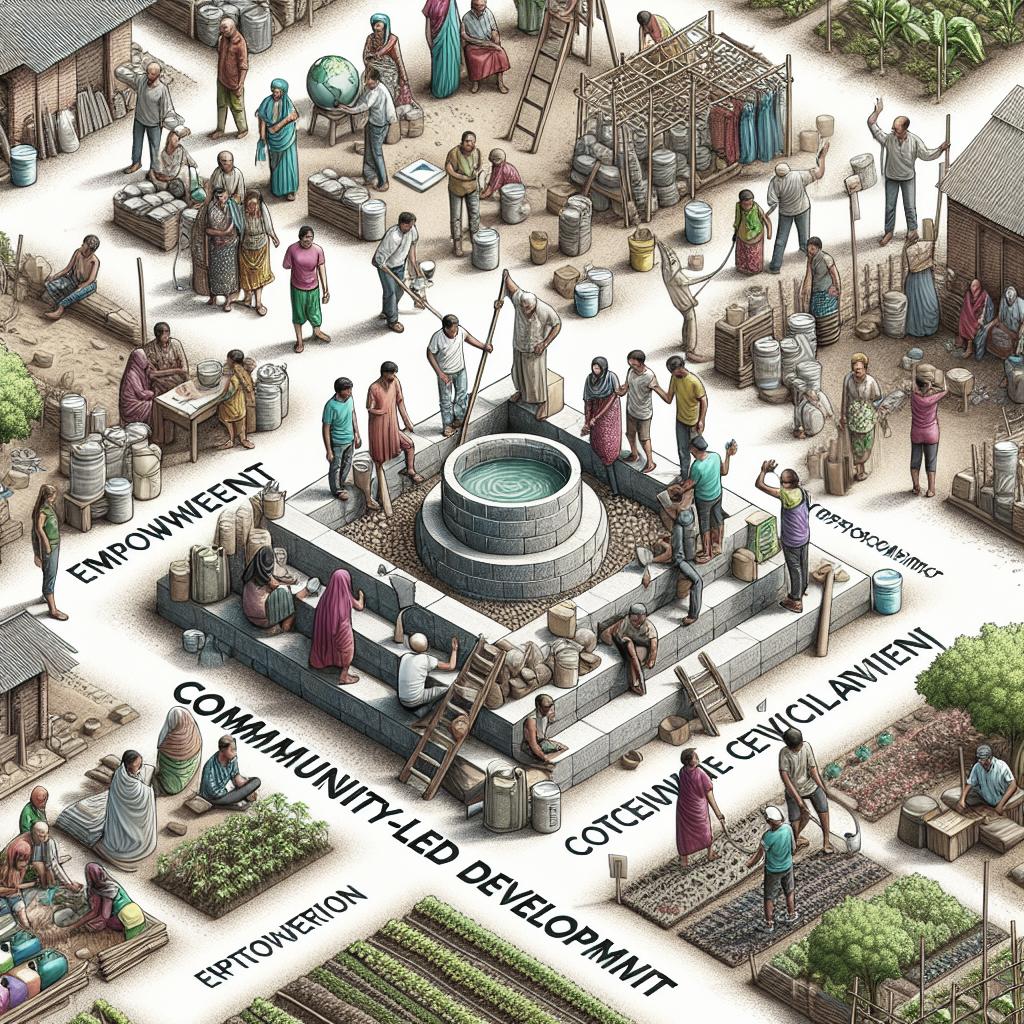“`html
Facilitating Community-Led Development for NGOs
In an era where community-led development is increasingly recognized as a pivotal approach to sustainable progress, non-governmental organizations (NGOs) play a vital role. This article delves into the core components necessary for facilitating such initiatives, examining the EU’s enlargement policies and offering an in-depth analysis of key findings for civil societies in the Western Balkans. We will explore the essential factors like participation, voice, and community assets, combined with capacity development and sustainability. The article will also highlight the importance of transformative capacity, collective planning, and accountability. Community leadership, adaptability, and collaboration are critical themes throughout, providing insights into how NGOs can empower local communities to enact lasting change. Lessons learned are compiled in a concluding table for reference.
2024 EU Enlargement Package Released
The 2024 EU Enlargement Package marks a significant milestone, emphasizing the EU’s commitment to advancing socio-economic development and enhancing policymaking frameworks. Several aspiring EU members from the Western Balkans are gearing up for new opportunities and challenges introduced by this package. The latest enlargement strategy provides a roadmap for these nations to navigate the complexities of political reforms, governance, and economic advancement.
This policy shift presents an opportunity for NGOs to leverage community-led development practices, aligning local initiatives with broader regional goals. By understanding and integrating the EU’s outlined priorities, NGOs can foster stronger partnerships with governmental bodies and local communities, ensuring that development efforts are rooted in the actual needs of the people they aim to serve.
BCSDN’s In-Depth Analysis on Key Civil Society Findings for Western Balkans Coming Soon!
The Balkan Civil Society Development Network (BCSDN) is preparing to release a comprehensive analysis that will offer valuable insights into the role of civil society in the Western Balkans’ future. This report is expected to highlight key findings on how NGOs can advocate for change and contribute to democratic processes through community-driven approaches.
As the Western Balkans grapple with socio-political challenges, BCSDN’s findings will provide an evidence-based framework for NGOs to implement community-led development effectively. This analysis is designed to guide NGOs in enhancing civic engagement, fostering resilience and ensuring their initiatives align with regional priorities and citizens’ needs.
Participation
Participation is the cornerstone of community-led development. For NGOs, cultivating an environment where community members actively engage in development processes contributes to a sense of ownership and empowerment. Effective participation involves a range of strategies, including inclusive decision-making forums and workshops that ensure diverse community voices are heard.
NGOs must foster participatory mechanisms that can effectively bridge the gap between policymakers and citizens. By adopting participatory tools and platforms, communities are empowered to influence decisions impacting their lives, thus creating more democratic and transparent development processes.
Voice
Amplifying the voice of community members is crucial for meaningful engagement. NGOs should focus on creating channels where individuals can express their concerns, ideas, and aspirations. This can involve utilizing both traditional and digital platforms to extend reach and inclusivity.
By prioritizing open communication and feedback loops, NGOs can ensure that the voiced needs and desires of the public guide their project priorities. This leads to more relevant, responsive, and sustainable outcomes that reflect the true aspirations of the communities they serve.
Community Assets
Recognizing and leveraging community assets is fundamental in driving community-led development. These assets include not only physical infrastructure but also intangible resources like local knowledge, cultural heritage, and social networks. By identifying these strengths, NGOs can build upon what is already working well within a community.
NGOs can play a transformative role by harnessing these assets to inspire and catalyze change from within. This approach encourages self-reliance and reduces dependencies on external aid, fostering sustainable growth and resilience over time.
Capacity Development
Capacity development is about equipping community members and leaders with the skills and knowledge necessary to spearhead local development. NGOs can facilitate training programs, workshops, and exchanges that build relevant competencies.
By investing in human capital, NGOs empower communities to manage their development projects more effectively, fostering a culture of continuous learning and adaptation. This upstream investment pays dividends as communities become more adept at navigating challenges and seizing opportunities.
Sustainability
Sustainability ensures that community-led projects endure and remain effective over the long term. For NGOs, embedding sustainability into project planning entails considering environmental, social, and economic impacts.
NGOs must develop strategies that not only yield immediate outcomes but also contribute to lasting change, providing communities with the tools and frameworks necessary to maintain advancements independently. This might involve implementing eco-friendly practices, fostering economic resilience, and reinforcing social cohesion.
Transformative Capacity
Transformative capacity is the ability of communities to adapt to changes and transform challenges into opportunities. NGOs can nurture this capacity by promoting innovation and creativity within community-led processes.
This involves supporting initiatives that encourage experimentation and learning from failures. By creating a safe space for trial and error, NGOs can help communities adopt flexible approaches to problem-solving, ultimately leading to resilient and dynamic development progress.
Collective Planning and Action
Collaborative planning and coordinated action are vital for aligning stakeholders towards common development goals. NGOs can serve as facilitators, bringing together diverse actors to develop shared visions and action plans.
Through inclusive planning sessions, NGOs encourage dialogue and consensus-building, which strengthens partnerships and maximizes resource utilization. These collective efforts ensure more coherent and impactful community-led development initiatives.
Accountability
Accountability guarantees that stakeholders are responsible for their contributions and outcomes. NGOs must implement mechanisms to track progress and evaluate the impact of community-led projects rigorously.
Transparency in reporting and clear communication of results foster trust between NGOs and communities. This openness encourages greater participation and commitment from all stakeholders, enhancing the effectiveness and credibility of development efforts.
Community Leadership
Strong community leadership is essential for guiding successful development initiatives. NGOs should focus on identifying and mentoring local leaders who exhibit potential and a genuine commitment to their communities’ welfare.
By empowering these leaders, NGOs facilitate a bottom-up approach that ensures development reflects community priorities. Leadership development programs can equip individuals with the skills needed to advocate for change and inspire collective action.
Adaptability
Flexibility is integral to community-led development as it navigates evolving challenges and contexts. NGOs must cultivate adaptability within communities, ensuring that plans and actions can pivot in response to unforeseen circumstances.
Adoption of adaptive planning and implementation strategies allows NGOs and communities to respond agilely to threats and opportunities, enhancing resilience. This adaptability is crucial in sustaining progress and achieving long-term development goals.
Collaboration
Collaboration between various stakeholders, including government bodies, private sectors, and civil society, is critical for effective development. NGOs can act as connectors, fostering partnerships that amplify impact and bring diverse perspectives to the table.
By nurturing collaborative networks, NGOs ensure that resources, expertise, and knowledge are shared effectively, leading to innovative solutions that address complex community challenges. Collaborative approaches create synergies that enhance the reach and efficiency of community-led efforts.
Lessons Learned
| Key Component | Summary |
|---|---|
| Participation | Engaging communities in decision-making fosters ownership and empowerment. |
| Voice | Providing platforms for expression ensures that community needs shape development agendas. |
| Community Assets | Leveraging local strengths promotes self-reliance and reduces dependency on external aid. |
| Capacity Development | Building skills and knowledge enables communities to manage developmental challenges independently. |
| Sustainability | Sustainable planning considers long-term environmental, economic, and social impacts. |
| Transformative Capacity | Innovative approaches help communities convert challenges into developmental opportunities. |
| Collective Planning and Action | Collaboration among stakeholders maximizes resource utilization and impact. |
| Accountability | Transparency and clear communication foster trust and enhance development efficacy. |
| Community Leadership | Empowering local leaders ensures development aligns with community priorities. |
| Adaptability | Flexible strategies allow for agile responses to changing contexts. |
| Collaboration | Fostering partnerships enhances impact and brings diverse perspectives. |
“`


